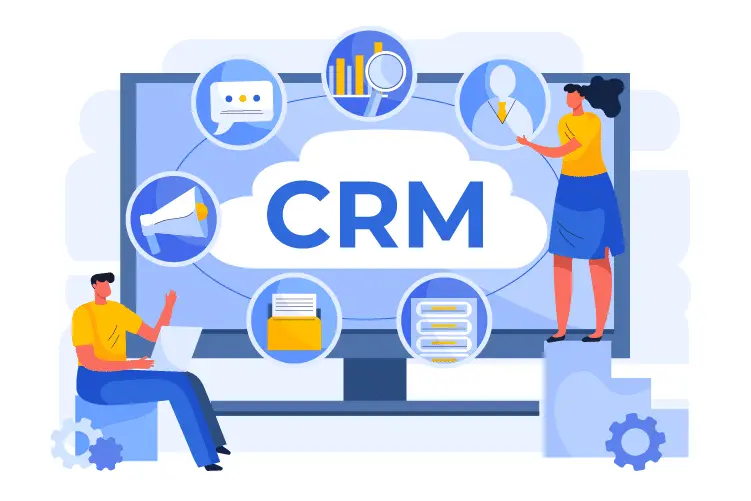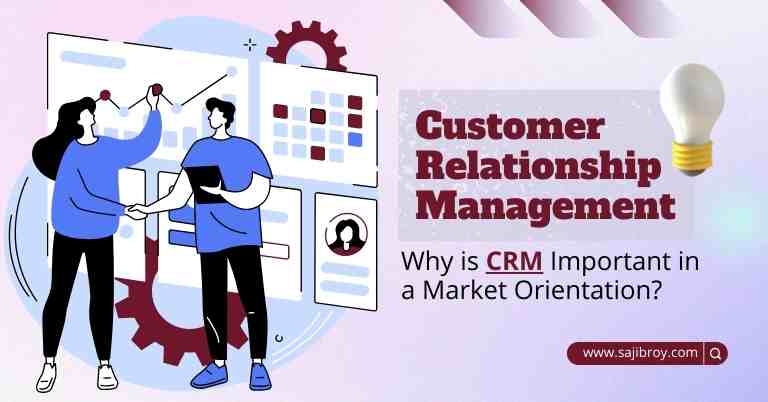Customer Relationship Management (CRM) is vital in a market orientation. It helps businesses understand and meet customer needs.
Market orientation focuses on customers. It aligns products and services with their desires. This approach boosts satisfaction and loyalty. CRM tools aid this process. They collect and analyze customer data. This helps businesses tailor their offerings. By understanding customer behavior, companies can predict trends.
They can also address issues quickly. This strengthens relationships and improves retention. In today’s competitive market, a strong CRM strategy is essential. It ensures businesses stay relevant and responsive. So, why is CRM important in a market orientation? It’s simple. It helps businesses thrive by putting customers first.
Importance Of Customer Relationship Management
Customer Relationship Management (CRM) plays a crucial role in market orientation. It focuses on understanding and meeting customer needs. CRM helps businesses build strong relationships with their customers. These relationships lead to increased satisfaction and loyalty. A good CRM system can improve a company’s performance. It does this by helping manage customer interactions effectively. Let’s explore how CRM can boost customer retention and enhance customer loyalty.
Boosting Customer Retention
Retaining customers is essential for any business. It costs less to keep existing customers than to acquire new ones. CRM systems help track customer interactions and preferences. This information allows businesses to provide personalized experiences. Personalized experiences make customers feel valued. Valued customers are more likely to stay loyal. CRM also helps identify potential issues early. Addressing issues quickly can prevent customer churn. Happy customers stay longer and buy more.
Enhancing Customer Loyalty
Customer loyalty is vital for long-term success. Loyal customers are more likely to recommend your business. CRM systems help businesses understand customer needs and preferences. With this knowledge, businesses can offer tailored solutions. Tailored solutions make customers feel understood and appreciated. CRM also helps track customer feedback. Responding to feedback shows that you care about their opinions. This builds trust and strengthens loyalty. Engaged customers are more likely to return.

Credit: www.icertglobal.com
Market Orientation Explained
Market orientation is a business philosophy. It focuses on identifying and meeting the needs of customers. Companies with this approach prioritize customer satisfaction. They adapt their products and services based on customer feedback. This strategy leads to better customer retention and loyalty.
Customer-centric Approach
A customer-centric approach places customers at the center of business decisions. Companies listen to their customers. They understand their needs and preferences. This approach helps in creating products that customers love. It also improves customer service and support. Happy customers are more likely to return and recommend the business.
Aligning Business Goals
Aligning business goals with market orientation ensures success. Businesses focus on what customers need. They set their goals accordingly. This alignment helps in achieving higher sales and growth. It also creates a strong brand reputation. Consistent customer satisfaction leads to long-term success.
Key Benefits Of Crm In Market Orientation
Customer Relationship Management (CRM) plays a pivotal role in a market-oriented business. It helps companies align their strategies with customer needs. By focusing on customer satisfaction, businesses can thrive. Let’s explore the key benefits of CRM in market orientation.
Improved Customer Insights
CRM systems collect and analyze customer data. This leads to better understanding of customer behaviors. Businesses can identify trends and preferences. Decision-making becomes data-driven and accurate. Companies can anticipate customer needs and act accordingly. This builds trust and loyalty.
Personalized Marketing Strategies
Personalized marketing strategies are crucial in today’s competitive market. CRM tools enable businesses to segment their audience. They can create targeted marketing campaigns. Personalized messages resonate more with customers. This increases engagement and conversion rates. It also enhances customer satisfaction.
Strengthening Customer Engagement
In a market-oriented business, customer engagement is crucial for success. Engaged customers are loyal and bring repeat business. They also recommend your products or services to others. This section explores how Customer Relationship Management (CRM) strengthens customer engagement.
Interactive Communication Channels
Using interactive communication channels is key to engaging customers. These channels include:
- Social media
- Chatbots
- Online forums
Emails can be personalized to address customer needs. Social media platforms allow for quick responses and real-time interaction. Chatbots provide immediate support. Online forums create communities where customers feel heard and valued.
Building Trust And Credibility
Building trust and credibility is essential. Trust comes from consistent, transparent communication. Credibility is earned through delivering on promises. CRM systems help track interactions and ensure follow-ups. This builds a strong relationship with customers.
A table can help visualize the benefits of trust and credibility:
| Benefit | Description |
|---|---|
| Customer Loyalty | Customers return because they trust the brand. |
| Positive Reviews | Credible brands receive good reviews and recommendations. |
In summary, interactive communication channels and building trust are vital for customer engagement. CRM helps in both areas, ensuring a loyal customer base.
Driving Sales Growth
Driving sales growth is essential for any business. Customer Relationship Management (CRM) helps companies achieve this by enhancing their market orientation. CRM systems provide tools and data that drive sales growth. They help businesses identify opportunities and streamline processes.
Identifying Sales Opportunities
CRM systems track customer interactions. This data reveals trends and patterns. Businesses can spot potential sales opportunities. For example, repeat purchases or inquiries about new products. Knowing these trends helps sales teams target the right customers. It increases the chances of closing deals.
Streamlining Sales Processes
CRM systems automate many sales tasks. This includes follow-ups, scheduling, and data entry. Automation saves time and reduces errors. Sales teams can focus more on engaging with customers. They spend less time on administrative tasks. This efficiency boosts sales productivity.
CRM systems also provide a centralized database. Sales teams access customer information quickly. They can prepare better for meetings and calls. Quick access to data makes interactions more effective. It builds stronger customer relationships. Strong relationships lead to more sales.
Enhancing Customer Support
Enhancing customer support is crucial in a market orientation. Effective customer support builds trust and loyalty. It ensures customers feel valued and heard. This section explores how Customer Relationship Management (CRM) systems can enhance customer support.
Efficient Query Resolution
CRM systems help manage customer queries swiftly. They store customer data in one place. This allows support teams to access information quickly. Quick access leads to faster query resolution. Customers appreciate prompt responses. It builds trust and satisfaction.
Proactive Customer Service
CRM systems allow businesses to anticipate customer needs. They can identify patterns and predict issues before they arise. This proactive approach can prevent problems. Customers feel cared for when their needs are anticipated. It fosters a positive relationship.
Data-driven Decision Making
Data-Driven Decision Making plays a vital role in Customer Relationship Management (CRM). Businesses can make informed choices by analyzing customer data. This approach enhances market orientation. It ensures that strategies align with customer needs and preferences.
Analyzing Customer Data
Analyzing customer data helps businesses understand customer behavior. It reveals patterns and trends. This information is crucial for making strategic decisions. It allows companies to predict future customer actions. They can tailor their services accordingly.
Customer data analysis involves various tools and techniques. These tools help in segmenting customers. Segmentation helps in targeting specific groups. It ensures that marketing efforts are effective. This targeted approach increases customer satisfaction and loyalty.
Optimizing Business Strategies
Optimizing business strategies is possible through data-driven insights. Companies can identify what works best for their customers. This allows for the fine-tuning of products and services. It ensures that offerings meet customer expectations. By doing so, businesses can improve their market position.
Data-driven strategies also help in resource allocation. They identify areas that need more attention. This ensures that resources are used efficiently. It leads to better outcomes and higher returns. Effective strategies also enhance customer experience. Happy customers lead to repeat business and referrals.

Credit: www.researchgate.net
Long-term Business Success
For any business, achieving long-term success is a primary goal. One of the key elements to this success is maintaining strong relationships with customers. This is where Customer Relationship Management (CRM) comes into play. CRM helps businesses build a loyal customer base, leading to sustainable growth and profitability.
Sustainable Competitive Advantage
A well-implemented CRM system offers a sustainable competitive advantage. It enables businesses to understand their customers better, personalize their experiences, and meet their needs efficiently. By maintaining detailed customer profiles, businesses can anticipate future needs and provide tailored solutions. This level of customer service builds trust and loyalty, setting a business apart from its competitors.
Adapting To Market Changes
The market is always changing. Trends evolve, customer preferences shift, and new competitors emerge. A robust CRM system helps businesses adapt to these changes quickly. With real-time data and analytics, businesses can track market trends and adjust their strategies accordingly. This agility ensures that they stay relevant and continue to meet the needs of their customers, even as the market evolves.
| Benefits of CRM | Description |
|---|---|
| Customer Insights | Helps in understanding customer preferences and behaviors. |
| Personalized Experience | Enables businesses to offer tailored solutions to customers. |
| Market Adaptability | Allows businesses to quickly adjust to market changes. |
| Customer Loyalty | Builds trust and loyalty through consistent and personalized service. |
In conclusion, CRM is crucial for businesses aiming for long-term success. It provides a sustainable competitive advantage and helps businesses adapt to market changes, ensuring they meet customer needs effectively.

Credit: www.sajibroy.com
Frequently Asked Questions
Why Is Customer Relationship Management Important In Market Orientation?
Customer relationship management is crucial in market orientation as it enhances customer satisfaction, loyalty, and retention, driving business growth.
Why Is Customer Relationship Management Important In Marketing?
Customer relationship management enhances customer satisfaction, boosts retention, and drives sales growth. It helps businesses understand customer needs, personalize interactions, and build loyalty.
Why Is Managing Customer Relationships Important?
Managing customer relationships boosts loyalty, enhances customer satisfaction, and increases repeat business. It helps identify customer needs and improve services. Strong relationships drive referrals and positive reviews, fostering business growth.
Conclusion
Building strong customer relationships is key in market orientation. It enhances loyalty and trust. Happy customers return. They also recommend your brand. This drives growth and increases profits. Effective CRM systems provide valuable insights. These insights guide better business decisions.
They help understand customer needs. Meeting these needs builds satisfaction. Strong relationships also reduce churn rates. Invest in CRM. It is crucial for success. Your business thrives with loyal customers. Customer relationship management is essential. Make it a priority today.
{ “@context”: “https://schema.org”, “@type”: “FAQPage”, “mainEntity”: [ { “@type”: “Question”, “name”: “Why is customer relationship management important in market orientation?”, “acceptedAnswer”: { “@type”: “Answer”, “text”: “Customer relationship management is crucial in market orientation as it enhances customer satisfaction, loyalty, and retention, driving business growth.” } } , { “@type”: “Question”, “name”: “Why is customer relationship management important in marketing?”, “acceptedAnswer”: { “@type”: “Answer”, “text”: “Customer relationship management enhances customer satisfaction, boosts retention, and drives sales growth. It helps businesses understand customer needs, personalize interactions, and build loyalty.” } } , { “@type”: “Question”, “name”: “Why is managing customer relationships important?”, “acceptedAnswer”: { “@type”: “Answer”, “text”: “Managing customer relationships boosts loyalty, enhances customer satisfaction, and increases repeat business. It helps identify customer needs and improve services. Strong relationships drive referrals and positive reviews, fostering business growth.” } } ] }